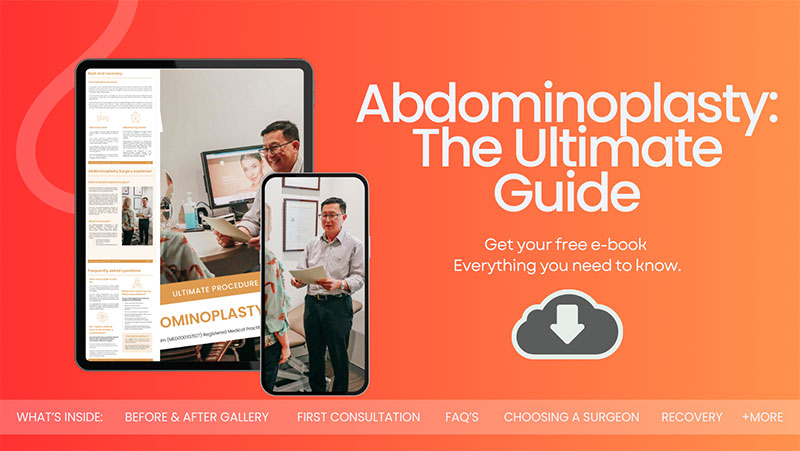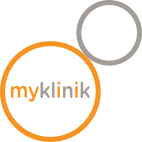Steps for a Smooth Abdominoplasty Surgery
When considering an abdominoplasty, commonly referred to as a tummy tuck, preparing yourself ahead of time is just as important as the surgery itself. This procedure, designed to remove excess skin and fat from the abdomen to create a smoother, firmer profile, requires not only skilled surgical hands but also a patient who is fully prepared both physically and mentally.
Preparing for an abdominoplasty isn’t just about getting your body ready; it involves setting the stage for a smooth surgery and a successful recovery. The steps you take in the weeks and months leading up to your procedure can significantly impact the ease of your surgery and the speed of your recovery.
Sydney Plastic Surgeon Dr Jake Lim aims to guide you through the essential steps for preparing for your abdominoplasty.
Download Dr Lim’s 2024 Abdominoplasty Guide

Preparation for Abdominoplasty Is Important
The success of an abdominoplasty goes beyond your surgeon’s skill. It involves the patient’s commitment to proper preparation. Understanding the surgery’s demands on your body and mind allows you to take proactive steps towards ensuring a smooth procedure and recovery. Preparing your body, arranging your recovery space, and mentally gearing up for the changes are all pivotal in minimising risks and enhancing your healing process.
Medications and Supplements
As you prepare for your abdominoplasty, understanding how medications and supplements can affect your surgery and recovery is critical. Both prescription medications and over-the-counter supplements can have significant impacts on your surgery’s safety and your body’s healing process.
Medications to Avoid Before Surgery
Certain medications can increase the risk of bleeding, affect how your blood clots, or interfere with anaesthesia. Common medications to avoid include anti-inflammatory drugs (such as ibuprofen and aspirin) and certain herbal supplements like ginkgo biloba, garlic, and vitamin E, which can also promote bleeding. It’s crucial to inform Dr Lim about all medications you are taking, including any over-the-counter drugs.
Dr Lim may advise you to stop taking these medications for a specific period before and after your surgery to minimise any potential risks. However, do not stop any medication without first consulting your healthcare provider, especially if you’re taking medications for chronic conditions.
Safe Supplements and Vitamins
While some supplements should be avoided, others may be beneficial both before and after your surgery. For example, vitamins such as Vitamin C are known to aid in the healing process. However, it’s essential to discuss any supplements with your surgeon before starting them, as they can provide guidance on what is safe and potentially beneficial for your specific situation.
Preparing Your Body for Abdominoplasty
Optimising your physical health before abdominoplasty is important for ensuring a smooth surgery and recovery. By focusing on nutrition, exercise, and weight stability, you can prepare your body for the demands of surgery and foster a more favourable healing environment.
Nutritional Guidelines for a Healthy Recovery
Good nutrition plays a role in your surgery preparation. A balanced diet rich in vitamins, minerals, and proteins can enhance your body’s ability to heal and recover. Incorporate a variety of fruits, vegetables, whole grains, and lean proteins into your diet to support tissue repair and maintain your immune system’s health. Consider reducing your intake of processed foods, sugar, and excessive fats, which can inflame your body and slow down the healing process.
Hydration is also a key component of your pre-surgery diet. Drinking plenty of water helps maintain optimal health and prepares your body for the effects of anaesthesia and surgery. Aim for at least eight glasses of water a day, and consider increasing your intake if you engage in regular exercise or live in a hot climate.
The Benefits of a Pre-Surgery Exercise Routine
Engaging in regular, moderate exercise before your surgery can improve your physical fitness and strengthen your body, making it better equipped to handle the stress of surgery and recovery. Activities such as walking, swimming, or cycling promote cardiovascular health without placing undue strain on your body.
Weight Management Tips before Surgery
Achieving and maintaining a stable weight before abdominoplasty is essential. Significant weight fluctuations can affect the surgery’s outcome and the appearance of your results. Aim for a healthy, stable weight by following a balanced diet and regular exercise program. If you’re having difficulty managing your weight, consider consulting a nutritionist or a personal trainer for personalised advice and support.
Stability in your weight ensures that the results of your abdominoplasty are as predictable and long-lasting as possible. Abdominoplasty is not a weight-loss solution but rather a procedure to remove excess skin and fat and tighten the abdominal muscles. Being close to your ideal weight before surgery can enhance the aesthetic outcomes and your overall satisfaction with the procedure.
How Water Intake Affects Your Surgery and Recovery
Hydration is a key factor in preparing for any surgery, including abdominoplasty. Proper hydration affects not only your overall health but also your body’s ability to heal and recover post-surgery.
Water is essential for every cell, tissue, and organ in your body, playing a crucial role in maintaining blood volume and allowing for proper circulation. This is especially important during surgery and recovery, as adequate blood flow is necessary for healing. Hydration also helps to ensure that your body can effectively process anaesthesia and aids in the elimination of toxins and waste products from your body after surgery.
Dehydration, on the other hand, can lead to complications such as decreased blood pressure, increased heart rate, and thicker blood, which can increase the risk of blood clots. Ensuring you are properly hydrated in the days leading up to your surgery can help minimise these risks.
Tips for Staying Properly Hydrated
Maintaining optimal hydration levels requires more than just drinking water; it involves understanding how much fluid your body needs and the best ways to meet those needs. Here are some tips to help you stay hydrated before your abdominoplasty:
- Monitor Fluid Intake: Aim for at least eight glasses of water per day, more if you are active, it’s hot outside, or are sweating more than usual
- Incorporate Foods with High Water Content: Fruits and vegetables like cucumbers, oranges, strawberries, and lettuce can contribute to your overall fluid intake
- Limit Diuretics: Beverages like coffee, tea, and alcohol can increase urine production and potentially lead to dehydration. While it’s not necessary to avoid these entirely, it’s wise to consume them in moderation and balance them with water intake
Quitting Smoking and Alcohol
Quitting smoking and limiting alcohol consumption are among the most significant steps you can take to prepare for abdominoplasty. Both smoking and excessive alcohol use can severely impact your surgery’s success and your recovery process.
- Smoking significantly hinders your body’s ability to heal. Nicotine constricts blood vessels, reducing blood flow to surgical sites, which can lead to delayed healing, increased risk of infection, and more pronounced scarring. Smoking also increases the risk of complications during anaesthesia. You cannot have any nicotine products of any form for eight weeks before and after the procedure.
- Alcohol, on the other hand, can affect your body’s immune system, making it harder to fight off infections. It can also increase the risk of bleeding and interact negatively with medications prescribed for surgery and recovery
The adverse effects of smoking and drinking on surgery outcomes are well-documented. Patients who smoke or consume alcohol excessively are more likely to experience complications during and after surgery, including:
- Poor wound healing
- Increased risk of infection
- Higher likelihood of unsatisfactory aesthetic results
- Prolonged recovery times
Preparing Your Recovery Space
Preparing your recovery space is a step towards a smooth and comfortable recovery from abdominoplasty. The environment in which you recuperate can significantly affect your healing process, comfort levels, and overall recovery experience. Here’s how you can create an optimal recovery space at home:
- Choose the Right Location: Your recovery area should be in a quiet, low-traffic part of your home where you can rest undisturbed. Ideally, it should be a space where you can sleep, relax, and have easy access to a bathroom
- Ensure Everything Is Within Reach: Set up your space so that everything you need is easily accessible without having to stretch or reach. This includes medications, water, snacks, remote controls, and any devices you might use to keep yourself entertained
- Adjustable Bed or Recliner: Sleeping in a slightly elevated position can help reduce swelling and discomfort. If you don’t have an adjustable bed, consider renting one or using a recliner as an alternative
- Prepare Your Bedding: Choose comfortable, soft bedding that can be easily changed. Having extra pillows can help you maintain a comfortable position and support your body
Essential Supplies for Post-Surgery Care
- Medications: Have all your prescribed medications and any recommended over-the-counter pain relievers or supplements ready and within easy reach
- Wound Care Supplies: Dr Jake Lim will provide specific instructions for wound care. Ensure you have all the necessary supplies, such as gauze, medical tape, and antiseptic solutions
- Convenient Clothing: Prepare loose, comfortable clothing that is easy to put on and take off without straining your abdominal area. Button-up shirts or blouses and elastic-waist pants are ideal
- Hydration and Nutrition: Keep water and healthy snacks by your side to stay hydrated and nourished. Consider preparing meals in advance and storing them in the refrigerator or freezer for easy access
Financial Preparation for Abdominoplasty
Financial preparation is an integral part of planning for abdominoplasty. Planning for the costs associated with your surgery can help ensure that you’re not only ready for the procedure but also for the recovery period without unnecessary financial stress.
Understanding the Costs Involved
Abdominoplasty is a significant investment in your health and appearance. The total cost typically includes your surgeon’s fee, anaesthesia fees, hospital or surgical facility costs, medical tests, post-surgery garments, and follow-up appointments. It’s important to have a detailed discussion with Dr Lim’s office to understand all the potential costs upfront.
Planning for the Expenses
- Budgeting: Once you have an estimate of the total cost, create a budget to plan how you will cover these expenses. If you need to save up for the surgery, consider setting aside a certain amount each month into a dedicated savings account
- Emergency Fund: It’s also wise to plan for unexpected expenses, such as additional medical tests or extended recovery time. Having an emergency fund can provide peace of mind and prevent financial strain
Considering Insurance and Payment Options
- Insurance Coverage: Most cosmetic surgeries, including abdominoplasty, are not covered by health insurance. However, if your surgery is deemed medically necessary (for example, if you’re having it to remove excess skin after significant weight loss that’s causing health issues), part of the cost may be covered by Medicare and private health insurance. Check with your insurance provider to understand what, if any, coverage is available
- Saving on Costs: While it might be tempting to look for ways to save on the cost of your abdominoplasty, it’s crucial to prioritise quality and safety over price. Choosing a qualified, experienced surgeon and a reputable surgical facility should be your top considerations
Taking Time off Work and Social Obligations
The recovery period is a vital time for your body to heal, and managing these aspects of your life in advance can significantly impact your stress levels and recovery experience.
Planning Your Time off Work
- Assessing Recovery Time: Recovery time varies by individual, but most people need to take at least two to four weeks off from work, especially if their job involves physical activity. Discuss with Dr Lim what to expect based on your specific situation
- Communicating with Your Employer: Inform your employer about your need for time off as soon as possible, and provide them with a general timeframe for your recovery. You don’t need to disclose the specifics of your surgery, but it’s important to communicate your anticipated absence
- Utilising Leave Benefits: Explore your options for using sick leave, vacation time, or unpaid leave. Some employers may offer short-term disability for surgeries, so check if you’re eligible for any additional benefits
FAQs about Preparing for Abdominoplasty

How long before my abdominoplasty should I start preparing?
- It’s advisable to start preparing for your abdominoplasty at least 4 to 6 weeks before your scheduled surgery. This timeframe allows you to make necessary lifestyle adjustments, such as quitting smoking, improving your diet, and beginning or adjusting your exercise routine. It also gives you ample time to undergo any required medical evaluations, adjust medications as advised by Dr Lim, and arrange for your recovery period, including taking time off work and setting up your recovery space at home.
Why do I need to quit smoking before abdominoplasty?
- Quitting smoking and stopping any products with nicotine is crucial before undergoing abdominoplasty because nicotine constricts blood vessels, which can significantly impair your body’s ability to heal. Smoking can increase the risk of complications during and after surgery, including poor wound healing, increased risk of infection, and more pronounced scarring. Dr Jake Lim recommends quitting smoking at least 8 weeks before surgery and after surgery to improve your recovery outcomes.
Can I continue taking my regular medications before surgery?
- You should discuss all medications you’re taking with Dr Jake Lim during your pre-surgery consultations. Some medications, especially those that can affect blood clotting (like aspirin or certain anti-inflammatory drugs) or supplements that can increase bleeding risk, may need to be temporarily stopped. Dr Lim will advise you on which medications to continue or stop, and when to do so, to ensure your surgery goes smoothly and safely.
What should I include in my recovery space at home?
- Your recovery space should be a comfortable, quiet area where you can rest and heal. Include a bed or recliner that allows you to maintain a semi-upright position, easy access to your medications, plenty of water and healthy snacks, and entertainment options like books, a laptop, or a TV. Also, ensure you have easy access to the phone and any wound care supplies Dr Lim recommends. Preparing your space before surgery can significantly enhance your comfort and convenience during recovery.
How can I manage my anxiety leading up to surgery?
- It’s normal to feel anxious before surgery. Managing pre-surgery anxiety can involve several strategies: educate yourself about the procedure and recovery process, communicate openly with Dr Lim and support network about your fears, practice relaxation techniques like deep breathing or meditation, and focus on the positive outcomes you’re aiming for. If your anxiety feels overwhelming, consider seeking support from a professional counsellor or therapist who can provide additional coping strategies.
Further Reading about Abdominoplasty with Sydney Plastic Surgeon Dr Jake Lim
- Read more about Will I Still Have Abdominal Rolls or Folds After Abdominoplasty Surgery?
- Read more about How Your BMI Impacts Abdominoplasty Results
- Read more about 7 Things You Need to Know about Pregnancy after Abdominoplasty
- Read more about Medicare Cover for Abdominoplasty Surgery in Sydney
- Read more about Recovery after Tummy Tuck – Abdominoplasty
- Read more about Best Sleep Positions after Abdominoplasty
- Read more about Maintaining Abdominoplasty Results with Diet & Exercise
Medical References about Abdominoplasty
- Tummy Tuck Preparation – American Society of Plastic Surgeons – American Society of Plastic Surgeons
- Your 6-month guide to planning a tummy tuck – American Society of Plastic Surgeons
- Tummy tuck recovery: Timeline and tips – Medical News Today
- Tummy Tuck (Abdominoplasty): Surgery, Recovery, Risks – Cleveland Clinic




